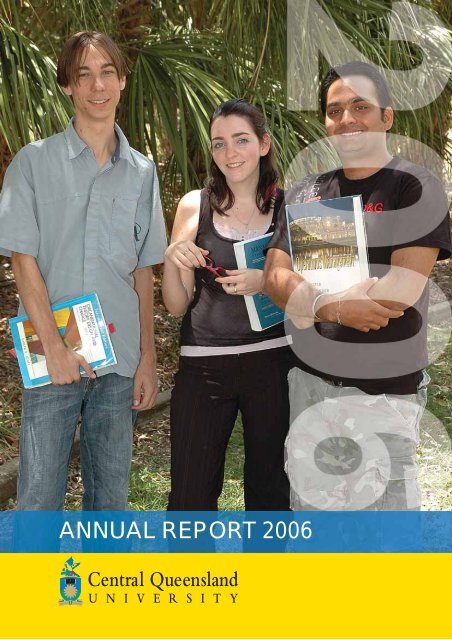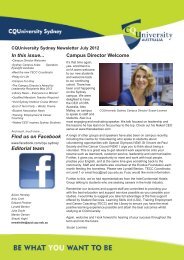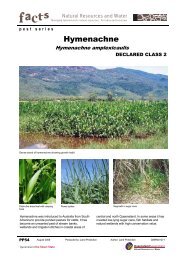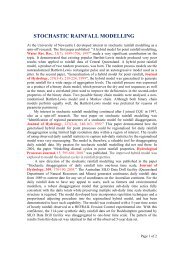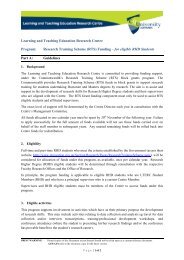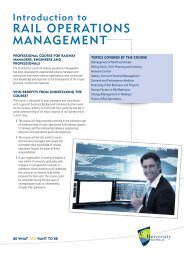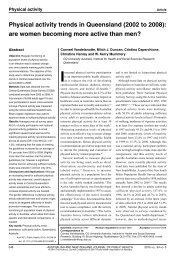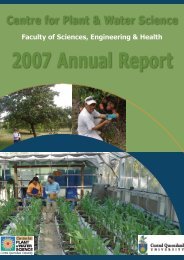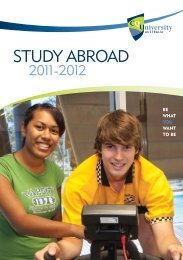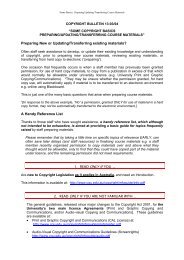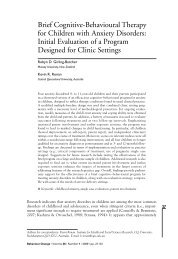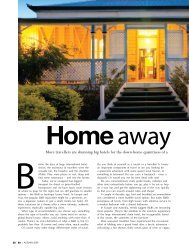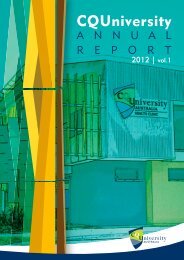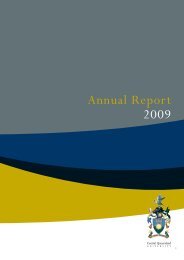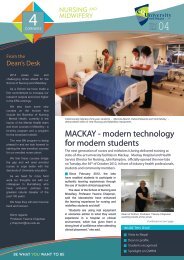Annual Report 2006 - Part 1 - Central Queensland University
Annual Report 2006 - Part 1 - Central Queensland University
Annual Report 2006 - Part 1 - Central Queensland University
- No tags were found...
Create successful ePaper yourself
Turn your PDF publications into a flip-book with our unique Google optimized e-Paper software.
ANNUAL REPORT <strong>2006</strong>
• CQU at a Glance ........................................................................... 4• Vice-Chancellor and President’s <strong>Report</strong> and 2007 Outlook ......... 5• Organisation ................................................................................. 8• Highlights and Challenges of <strong>2006</strong> ............................................ 14• Strategic Plan <strong>2006</strong>–2011 .......................................................... 15• Review of Activities ................................................................... 20• Performance <strong>Report</strong>ing and Benchmarking ............................... 26• Corporate Governance ................................................................ 42• Appendix—Financial <strong>Report</strong>sCONTENTSContents1
The aim of <strong>Central</strong> <strong>Queensland</strong> <strong>University</strong>’s <strong>Annual</strong><strong>Report</strong> for <strong>2006</strong> is to:• highlight the <strong>University</strong>’s performance and achievementsin line with the goals and objectives detailed in itsStrategic Plan <strong>2006</strong>–2011;• demonstrate the <strong>University</strong>’s effective management ofresources;• meet the <strong>University</strong>’s formal reporting requirements tothe State Minister for Education, Training and the Arts.This report will be of interest to Members of Parliament,CQU staff, students, prospective students, key stakeholders,other universities, researchers and interested members ofthe wider community.<strong>Central</strong> <strong>Queensland</strong> <strong>University</strong> is also referred to as‘CQU’ throughout this report.Further InformationThis report was produced by the Executive Director(Corporate Services) at <strong>Central</strong> <strong>Queensland</strong> <strong>University</strong>.Printed by <strong>Central</strong> <strong>Queensland</strong> <strong>University</strong>’s PublishingUnit.Print run and cost: 650 at $6.85 per copyISSN 1320-0062© <strong>Central</strong> <strong>Queensland</strong> <strong>University</strong> 2007Copies of the <strong>2006</strong> <strong>Annual</strong> <strong>Report</strong> are available from theExecutive Director (Corporate Services) at <strong>Central</strong> <strong>Queensland</strong><strong>University</strong>, Bruce Highway, Rockhampton, Qld, 4702.Ph: +61 7 4930 9777.Fax: +61 7 4930 9438.The <strong>Report</strong> is also available online athttp://www.cqu.edu.auFeedback in writing to the above address is invited.COMMUNICATIONOBJECTIVES2Communication Objectives
The Honourable Rod Welford, MPMinister for Education, Training and the ArtsEducation HouseMary StreetBrisbane QLD 4000Dear MinisterIn accordance with section 46J of the Financial Administration and Audit Act 1977, and the <strong>Central</strong> <strong>Queensland</strong> <strong>University</strong> Act1998, the Council of <strong>Central</strong> <strong>Queensland</strong> <strong>University</strong> is pleased to transmit to you the following report on the proceedings of the<strong>University</strong> during <strong>2006</strong>.The <strong>University</strong>’s journey of organisational restructuring and renewal gained considerable momentum during the year with thecommencement of the new Executive Team appointed to lead the change agenda and future developments.A new Council was constituted in May <strong>2006</strong> in alignment with the requirements of the Higher Education Support Act 2003,National Governance Protocols.Significant developments for <strong>2006</strong> include—a review of the <strong>University</strong>’s research capability and performance, identifyingfour major areas of research focus—Resourcing <strong>Queensland</strong>, Healthy Communities, International and Multimodal Education,and Accounting and Organisational Performance; implementation of the new three Faculty operating model; mainstreaming ofthe <strong>University</strong>’s international administration and support functions; proposals for a restructure of the <strong>University</strong>’s relationshipwith C_Management Services Pty Ltd; the development and implementation of an action plan following the AustralianUniversities Quality Agency audit; and the establishment of a new venture in Heretaunga, near Wellington, New Zealand.2007 will become another significant year in the continued reshaping and renewal of the <strong>University</strong>, under the guidance ofa revised Strategic Plan 2007–2011, adopted by Council on 8 December <strong>2006</strong>. We will pay particular attention to our fallingdomestic and international student enrolments and to an improved engagement with our <strong>Central</strong> <strong>Queensland</strong> community.Yours sincerelyR. C. FRITSCHYChancellorR. C. Fritschy, ChancellorCHANCELLOR’S LETTERTO THE MINISTERChancellorʼs Letter to the Minister3
<strong>Central</strong> <strong>Queensland</strong> <strong>University</strong> (CQU) is a multi-campusuniversity with campuses in Rockhampton, Bundaberg,Gladstone, Mackay and Emerald plus delivery sites on theSunshine Coast. The <strong>University</strong> also operates internationalcampuses in Sydney, Brisbane, Melbourne, Gold Coast andFiji. In addition, CQU has offshore delivery sites in HongKong, New Zealand, Singapore and Shanghai.CQU was founded in 1967 as the <strong>Queensland</strong> Institute ofTechnology (Capricornia). It became the Capricornia Instituteof Advanced Education in 1971 before a transition phaseas the <strong>University</strong> College of <strong>Central</strong> <strong>Queensland</strong> in 1990.CQU achieved <strong>University</strong> status in January 1992. At thattime the <strong>University</strong> was known as the <strong>University</strong> of <strong>Central</strong><strong>Queensland</strong>. The name was changed on 1 January 1994 to<strong>Central</strong> <strong>Queensland</strong> <strong>University</strong>.CQU now offers a wide range of undergraduate andpostgraduate courses on-campus and by distance education.In 2005 CQU began the process of restructuring the<strong>University</strong>, changing from a five to three faculty structure.The new faculties in <strong>2006</strong> were:• The Faculty of Arts, Humanities and Education;• The Faculty of Business and Informatics; and• The Faculty of Sciences, Engineering and Health.CQU hosts the Institute for Sustainable RegionalDevelopment and four designated research centres:• Centre for Environmental Management• Centre for Railway Engineering• Centre for Social Science Research• Primary Industries Research CentreCQU is also a partner in four Co-operative ResearchCentres (CRCs):• CRC for Coastal Zone, Estuary and WaterwayManagement• CRC for Cast Metals Manufacturing• CRC for Railway Engineering and Technologies• CRC for Integrated Engineering Asset ManagementCampuses wholly operated by CQU:• Rockhampton• Bundaberg• Gladstone• MackayCampuses and/or delivery sites operated in association withother higher education organisations:• Emerald (with the Australian Agricultural CollegeCorporation)• Noosa Hub (with Education <strong>Queensland</strong>)• Sunshine Coast (with <strong>University</strong> of Sunshine Coast)Campuses and/or delivery sites operated in association withC_Management Services Pty Ltd:• Sydney (with C_Management Services)*• Melbourne (with C_Management Services)*• Brisbane (with C_Management Services)*• Gold Coast (with C_Management Services)*• Fiji (with Campus Group Fiji)Multifunction delivery sites:• Hong Kong (with Hong Kong College of Technology)• Singapore (with Hartford Global Holdings ManagementSystems)• Shanghai (with LaSalle International Design College)• New Zealand (with Campus Group Holdings)(* CQU has a 50% interest in C_ManagementServices Pty Ltd)CQU AT A GLANCE4CQU at a Glance
In <strong>2006</strong> <strong>Central</strong> <strong>Queensland</strong> <strong>University</strong> continued thejourney of organisational restructure and academic renewalwhich it had embarked upon in 2005. The new threeFaculty model was implemented in January <strong>2006</strong>, whichconsolidated the <strong>University</strong>’s academic components intothe Faculties of Arts, Humanities and Education; Businessand Informatics; and Sciences, Engineering and Health. Asforeshadowed last year, a new senior executive team wasappointed to lead the <strong>University</strong>’s change agenda and futuredevelopment over the next five years. The Executive Team,which all report directly to the Vice-Chancellor and President,comprises:• Professor Angela Delves, Deputy Vice-Chancellor• Professor Gus Geursen, Executive Dean—Faculty of Business and Informatics• Professor Jennelle Kyd, Pro Vice-Chancellor(Research and Innovation)• John Nelson, Executive Director (Resources)• Professor Alex Radloff, Pro Vice-Chancellor(Academic Services)• Professor Richard Smith, Executive Dean—Faculty of Arts, Humanities and Education• Professor Elizabeth Taylor AO, Executive Dean—Faculty of Sciences, Engineering and Health• Ken Window, Executive Director (Corporate Services)A number of other senior appointments were made in<strong>2006</strong>, including the appointment of new Heads of Campus—Professor Phillip Clift in Bundaberg, Dr Pierre Viljoen inGladstone and Dr Trevor Davison in Mackay. Peter Edwardswas appointed Director of the Information TechnologyDivision, following the retirement of long-serving DirectorIan Jenkins. The senior academic ranks were also enhancedconsiderably in <strong>2006</strong> with offers of appointment being madein a range of Professorships across the Faculties. This willresult in a positive investment in intellectual capital for the<strong>University</strong>, and some of the new senior academics will bebased at the <strong>University</strong>’s Australian International Campuses.The process of restructuring and re-engineering the<strong>University</strong>’s structures, procedures and systems has gainedconsiderable momentum since the arrival of the newExecutive team early in the year. The policy statementManaging Change—Principles and Processes—Organisational Review <strong>2006</strong> was developed, which outlinesthe consultation process required for any proposed changeswithin the <strong>University</strong> and identifies the overarching guidingprinciples to maximise job security for employees whilst alsoallowing restructuring to be completed in a timely manner.During the course of the year it was recognised by seniormanagement that individual reviews of various areas of the<strong>University</strong> cannot be conducted in isolation and that it isimportant to gain an understanding of the essential interfaceand connectivity between all of the separate areas of the<strong>University</strong>. To achieve this aim an external consultant wasengaged to conduct an overarching review of the systemsand processes which underpin the functions of the <strong>University</strong>,with the desired outcome of achieving more streamlined andeffective systems, reducing bureaucratic and outdatedred-tape throughout the organisation, and ensuring thenecessary academic support services and administrativeprocesses are in place. This review will continue into 2007with a view to being fully implemented by the end of thatyear.VICE-CHANCELLOR AND PRESIDENT’SREPORT AND 2007 OUTLOOKVice-Chancellor and Presidentʼs <strong>Report</strong> and 2007 Outlook5
In <strong>2006</strong> CQU conducted a review of its researchcapability and performance, enabling it to identify four majorareas of research focus, being Resourcing <strong>Queensland</strong>;Healthy Communities; International and MultimodalEducation; and Accounting and Organisational Performance.The process involved in identifying these key researchthemes involved consultation with relevant stakeholders inthe industry, business, government and community sectors.The Resourcing <strong>Queensland</strong> focus area will build on thecurrent strength of the <strong>University</strong>’s Centre for RailwayEngineering, Centre for Process Engineering and LightMetals, Centre for Environmental Management and theInstitute for Sustainable Regional Development. The HealthyCommunities initiative aims to promote healthy, safe andviable communities and the government sector has shownconsiderable interest in this area. CQU also intends to investin becoming a world class centre for the study of thosefactors which impact on international students, and thepedagogy associated with those students—an area in whichthe <strong>University</strong> already has considerable expertise.The Australian Universities Quality Agency released itsAudit <strong>Report</strong> of CQU in February which was a reasonably fairand balanced report of CQU. The <strong>University</strong> is developingits Audit Action Plan in response to the <strong>Report</strong>, which willprovide a useful foundation to influence the ongoing tasksof restructuring the <strong>University</strong> and assuring quality acrossthe organisation.CQU’s highly successful STEPS (Skills for TertiaryEducation Preparatory Studies) bridging program celebratedits 20th anniversary in <strong>2006</strong> and during the celebratoryevents held throughout the <strong>University</strong>’s campus networkduring the year I was particularly moved by the dedicationand achievement of our students. Their stories reinforced thepositive influence the STEPS program and the <strong>University</strong> havehad on their lives.CQU was commended on many fronts in <strong>2006</strong>, butparticularly in relation to the value-added support weprovide to our students. The <strong>University</strong> received a <strong>2006</strong><strong>Queensland</strong> Multicultural Award and was highly commendedfor its international support services and pastoral care atthe <strong>Queensland</strong> Education and Training International (QETI)Awards. Jenny Simpson, a lecturer with the STEPS program,was awarded a <strong>2006</strong> Citation for Outstanding Contributionsto Student Learning by The Carrick Institute for Learning andTeaching in Higher Education. For the third year running,CQU received five stars and placed among the highest rateduniversities in Australia for positive student outcomes in theGood Universities Guide (Undergraduate) 2007.In the international arena, CQU began a new enterprisewith its joint venture partner Campus Group Holdings to opena campus in Heretaunga, near Wellington, New Zealand.CQU is in the process of restructuring its joint venturepartnership with C_Management Services Pty Ltd whichoperates its Australian International Campuses, in orderto obtain for the <strong>University</strong> some enhanced security andcertainty over its most significant revenue source by buildinga strong and accountable framework for the conduct of itshighly profitable international student business.VICE-CHANCELLOR AND PRESIDENT’SREPORT AND 2007 OUTLOOK6Vice-Chancellor and Presidentʼs <strong>Report</strong> and 2007 Outlook
The outlook for CQU in 2007 will see a continuationof the process commenced in <strong>2006</strong> of re-engineering andreinvigorating the <strong>University</strong>’s domestic course offerings.CQU has been very successful in its co-op programs, withthe engineering co-op program successfully challenging thetraditional engineering faculties at other universities withits unique partnership arrangement with the resource andmining companies which service the <strong>Central</strong> <strong>Queensland</strong>region. Similarly, CQU has introduced a new nursing programwhich places a greater emphasis on providing students withclinical experience. CQU’s other groundbreaking program isits Bachelor of Learning Management, which has receivedacclaim from both the State and Federal Governments. CQUtends to achieve more success with the programs in which ithas worked closely with its regional stakeholders, and this issomething it will expand upon in the future.CQU is a truly unique regional <strong>University</strong>. At its core isthe provision of higher education to its <strong>Central</strong> <strong>Queensland</strong>region through its campuses in Rockhampton, Mackay,Bundaberg, Gladstone and Emerald. However, unlikemany regional Universities, where the home campus isthe dominant campus, CQU is different. Our administrativeheadquarters are located in Rockhampton, and we are asignificant provider of flexible and distance learning, whichis mostly serviced from Rockhampton. However, half of CQU’sbusiness continues to be servicing international studentsbased at our Australian International Campuses in Brisbane,the Gold Coast, Melbourne and Sydney. This will continue tobe a major focus for 2007.In 2007 CQU will also continue to remain very committedto its region, and will not move from this strong commitment.However, it does recognise that in order to grow, prosperand remain viable, it must seek alternative sources ofincome. CQU cannot rely on Government funding alone, andmust seek new ways of doing its business in a way that isentrepreneurial. For example, the flexible/distance learningarea could be further developed in this way and this is amatter that the <strong>University</strong> wishes to explore in more detailin the future.There has been a significant softening in demand indomestic enrolments, most of which is beyond the controlof the <strong>University</strong>. However, it is important to understandthe demographics of the student market and in order toaddress this downturn in domestic student numbers a marketresearch project will be commissioned by the <strong>University</strong> in2007 to gain a better understanding of the student marketand increase the <strong>University</strong>’s marketing activity in a moretargeted manner.2007 also marks the 40th anniversary of CQU’s inceptionand the 15th anniversary of it becoming an independent<strong>University</strong>. In looking forward to this landmark year I amcommitted to working closely with our students, our staff,our communities and our partners to ensure the futureprosperity of our <strong>University</strong>.Yours sincerely,Professor John RickardVice-Chancellor and PresidentProfessor John RickardVice-Chancellorand PresidentVICE-CHANCELLOR AND PRESIDENT’SREPORT AND 2007 OUTLOOKVice-Chancellor and Presidentʼs <strong>Report</strong> and 2007 Outlook7
Organisation—Academic and Administrative StructurePro Vice-Chancellor(Research and Innovation)Prof Jennelle KydCorporate relationships Campusrelations including Heads ofCampus Research ServicesDeputy Vice-ChancellorProf Angela DelvesStanding Deputy to VC ChiefOperating Officer Academic Policy andDevelopment Human Resources andEquity International Office Chair,Budget and Planning GroupPro Vice-Chancellor(Academic Services)Pro Alex RadloffDTLSLibraryI.T.Student ServicesNullo YumbahExecutive Director(Corporate Services)Mr Ken WindowCompliance Risk Planning QualityStudent AdministrationSecretariat including councilVice-Chancellorand PresidentProf John RickardPublic Relations andMarketing <strong>University</strong> RelationsRelations with CMSExecutive Director(Resources)Mr John NelsonFinance and Budget FacilitiesUni Business including CapricorniaCollege, Bookshop, Travel CrewExecutive DeanProf Richard SmithFaculty of Arts,Humanitiesand EducationExecutive DeanProf Gus GeursenFaculty of Businessand InformaticsExecutive DeanProf Elizabeth TaylorFaculty of Sciences,Engineering and HealthORGANISATION8Organisation
Principal Officers as at 31 December <strong>2006</strong>ChancellorRennie Fritschy, BEng(Chem) Sydney, BEc WAust, FIEAust,GAICDVice-Chancellor and PresidentProfessor John Rickard, BSc(Hons), PhD London, FANZAMDeputy Vice-ChancellorProfessor Angela Delves, DipEd Bath, BSc (Hons) Bath UK,PhD Hull UKPro Vice-Chancellor (Research and Innovation)Professor Jennelle Kyd, BSc(Hons) UNSW, GradDipEd, PhDNewcastlePro Vice-Chancellor (Academic Services)Professor Alex Radloff, BA(Hons), MA(Psych) UCT, PhD(Ed)MUExecutive Director (Corporate Services)Kenneth Window, BA, MPubAdmin Qld, MEdAdmin UNE,FAIM, FCISExecutive Director (Resources)John Nelson, BCom Qld, FCPAPresident (Academic Board)Professor Bob Miles, BSc(Hons), PhD Griffith, FAIMExecutive Dean(Faculty of Arts, Humanities and Education)Professor Richard Smith, CertTeach Sydney, BEd, BA (Hons),PhD QldExecutive Dean(Faculty of Business and Informatics)Professor Gus Geursen, CMA, B Bus, PhD, IMA, IIDM,ANZMAC, ANZAM, AAA, SDS, AIMExecutive Dean(Faculty of Sciences, Engineering and Health)Professor Elizabeth Taylor AO, BEng UNSW, LLB(Hons) UTS,FIEAust, CPEngActing Head of Campus, CQU BundabergDr Helen Huntly, DipTeach(SecHPE) Kelvin Grove, BEd BCAE,MEdSt, EdD CQUCampus Coordinator, CQU EmeraldPat Moran, BEd, MScActing Head of Campus, CQU GladstoneDr Andrew Wallace BA (Hons), PhD Univ. of Qld.Head of Campus, CQU MackayProfessor Phillip Clift, BEcon (Hons) Qld, MSc Edin, FSS,FAIMHead, CQU Noosa HubDavid R Turner, Dip T, BEd, MBA, MLMEdDirector (Division of Facilities Management)Phil Hancock, BInfoTech(CompSc) CSU, GradDip FacMgt,AFAIMDirector (Division of Library Services)Graham Black, BA Griffith, GradDipLib CCAE, MBA CQU,AALIADirector (Division of Human Resources)David Swann, BCom, MBA Qld, AFAHRIDirector (Division of Student Administration)Leanne White, BA CQUDirector (Division of Teaching and Learning Services)Dr Jeanne McConachie, GradCert(Man), Masters(PSM)Flinders, DBA SCU, ACODE, CADAD, AALL, AES, CAAUT,EDUCAUSE, HERDSA, IAGIJPL, ICDE, ODLAA, SEDAInterim Director (Marketing)Michael Donahue, BA (Communications) Fordham <strong>University</strong>Director (Financial Services Division)David Turner, CA BComm QldDirector (Information Technology Division)Peter EdwardsDirector (Nulloo Yumbah: CQU’s Indigenous Learning,Spirituality and Research Centre)Associate Professor William Oates, DipTeach (Prim) GCAE,BA UNE, MEd (Curriculum Stud) UNEORGANISATIONOrganisation9
CQU Committee StructureCouncilVice-Chancellorand PresidentOtherFacilitiesAcademic BoardExecutive Committee of the BoardEducation Committee of the BoardProgram Review GroupResources Sub-CommitteeResearch Committee ofAcademic BoardAnimal Ethics CommitteeHuman Research EthicsCommitteePostgraduate ResearchAdvisory PanelInsitutional BiosafetyCommitteeAppeals CommitteeExclusions CommitteeCommittee for Studentswith DisabilitiesChancellor’s CommitteeCouncil MembershipCommitteeExecutive Performanceand Remuneration CommitteeAudit, Compliance and RiskCommitteeCampus Advisory Committees(Bundaberg, Emerald,Gladstone, Mackay andRockhampton)Ceremonial and HarmonyAwards CommitteeExecutive AppointmentsCommitteeExternal Relations CommitteePlanning and ResourcesCommitteeVice-Chancellor’sExecutiveAcademic PromotionsCommitteeBudget Planning GroupCopyright AdvisoryCommitteeInformation TechnologySteering CommitteeInformation andCommunication TechnologyUser CommitteeInformation TechnologyTechnical Standards GroupSenior AppointmentsCommittee<strong>University</strong> Health and SafetyCommitteeEmergency ManagementCommitteeE-Rolment IssuesCommitteeHandbook Working <strong>Part</strong>yInternational User GroupPeopleSoft StudentUser GroupStaff ConsultativeCommitteeStudent User GroupFaculty EducationCommitteeFaculty ResearchCommitteeORGANISATION10Organisation
A new structure for the Committees of Council was adopted by Council on 28 February 2005. A comprehensive review of theVice-Chancellor’s Committees, Faculty Committees and other <strong>University</strong> Committees was undertaken by the Vice-Chancellor andPresident in <strong>2006</strong> to ensure efficient and effective decision making through the Committee structure.The following changes occurred to the structure during the year:Committees of the Vice-Chancellor and PresidentPlanning and Development Committee—abolishedInternational Strategy Group—abolishedBudget Committee—abolished; replaced by Budget and Planning GroupVice-Chancellor and President, Deputy Vice-Chancellors and Faculty Assembly Chairs—abolishedChancellery Executive/Student Association Executive—abolishedEmergency Management Committee—establishedFaculty CommitteesFaculty Assembly—abolishedFaculty Planning and Development Committee—abolishedFaculty Industry and Community Advisory Committee—abolishedOther CommitteesESOS Advisory Group—abolishedInternational User Group—establishedJoint Consultative Committee—abolishedStaff Consultative Committee (required by union collective agreement)—establishedTimetable Management Committee—abolishedORGANISATIONOrganisation11
Profiles of the CQU CouncilThe Council is responsible for the management andcontrol of the total operation of the <strong>University</strong> whichincludes its day to day affairs, property holdings andfinancial management. The Council has the full power andauthority to appoint and dismiss officers and employees ofthe <strong>University</strong>. It acts in all matters to advance the interestsand aspirations of the <strong>University</strong>.In meeting the requirements of the Higher EducationSupport Act 2003, ss33-15, National Governance Protocols,the <strong>Central</strong> <strong>Queensland</strong> <strong>University</strong> Act 1998 was amendedto provide Council with greater control of its membership.A new Council was constituted on 11 May <strong>2006</strong>.Council meetings are held on a bi-monthly basis.Official membersChairChancellorRennie Fritschy, BE(Chem) Sydney, BEc WAust, FIEAust,GAICDVice-Chancellor and PresidentProfessor John Rickard, BSc(Hons), PhD London, FANZAMPresident of Academic BoardProfessor Bob Miles, BSc(Hons), PhD Griffith, FAIMMembers appointed by the Governor-in-CouncilLynne Foley, BEc, DipEd Qld, AMusA, AFAIMLeesa Jeffcoat, BA, BEd CIAE, MEdAdmin QldDr Ken King, BSc(Eng)(Hons) London, MSc, PhD Leeds,CertTeachFHE Portsmouth, FAIM, CDecJim Tolhurst, BComm, MBA Qld, FCPA, FCIS, FAICDCharles Ware, BA, LLB(Hons) Qld, MBus(PubMgt), LLM,QUT, MLGMA, FAICDElected membersOne elected member of the academic staff (4 years)Dr Richard Whitwell, BEc(Hons) ANU, MFinMgt CQU, PhDUTS, DipLaw NSW, LPAB, ASA, CMA, AFAIMOne elected member of the general staff (4 years)Janette Davis, BBus(Acct) CQU, CIA, CCSA, MIIA (Aust)One elected member of the student body (2 years)Surendra Sharma, DipComAppl, BSc, BA(Hons) IndiaAdditional members appointed by Council (2 years)Grant CassidyVictor Mason, BSc(Eng), PhD Southampton, FIEAust, RPEQThomas Rosier, AssocDipBus CIAE, BComp CQU, JP, FNIATim Griffin, BEng(Civil), MBA CQU, FAICDSecretaryExecutive Director (Corporate Services) andSecretary to CouncilKenneth Window, BA, MPubAdmin Qld, MEdAdmin NE,FAIM, FCISMinute secretaryChris GalinovicCouncil agreed at its meeting on 10 September 2004 thatthe maximum period for a member’s service on the Councilwill normally be 12 years.ORGANISATION12Organisation
Council Record of Attendance <strong>2006</strong>Member No. of Meetings Total PossibleAttendedMeetingsDave Cardnell (5/2/06–26/5/06) 2 2Grant Cassidy (from 26/5/06) 5 5Cr Glenn Churchill (until 11/5/06) 1 2Lauren Danastas (until 11/5/06) 2 2Jan Davis (from 11/5/06) 6 6Ross Dunning Leave of absence (until 29/1/06) 0 0Dr John Fitzsimmons (until 11/5/06) 2 2Tim Griffin (from 26/5/06) 5 5Lynne Foley 7 7Rennie Fritschy (Chancellor) 7 7Assoc Prof Leone Hinton (until 11/5/06) 1 2Leesa Jeffcoat 6 7James Jensen (until 11/5/06) 1 2Dr Ken King 5 7Brendan Kirkman (until 11/5/06) 1 2Prof Alan Knight (until 4/2/06) 0 0Laurie Lefcourt (until 11/5/06) 1 2Dr Vic Mason (until 11/5/06) (from 26/5/06) 3 6Prof Bob Miles (from 27/5/06) 5 5Megan Morris (until 11/5/06) 1 2Prof John Rickard 7 7Thomas Rosier (until 11/5/06) (from 26/5/06) 4 6Surendra Sharma (from 11/5/06) 6 6Jim Tolhurst 6 7Charles Ware 7 7Dr Richard Whitwell 7 7Meetings (7): 10 March, 26 May, 10 July, 11 July (Special),21 August (Special), 22 September, 8 DecemberNote: New Council constituted 11 MayORGANISATIONOrganisation13
Highlights• CQU graduates continued to have one of the highestemployment rates in the country. CQU students rankalmost 10% higher than the national average. Over 90%of CQU graduates with a bachelor degree found full-timework within four months of finishing university—wellabove the national average of 82.4% (Graduate CareersAustralia). CQU students from the areas of building(100%), engineering (100%), psychology (100%) andsocial work (100%) were particularly successful gainingemployment.• CQU retained its 5-star rating for graduate outcomesin The Good Universities Guide 2007 (released in <strong>2006</strong>).The Guide gives CQU top ratings for Positive GraduateOutcomes, Indigenous <strong>Part</strong>icipation, Cultural Diversity,International Enrolments, Proportion Given Credit for TAFEStudies and Non-Government Earnings.• CQU is one of Australia’s top-rated and most sought-afteruniversities, leading the nation with the largest numberof international students studying in Australia (IDPAustralia—Term 1, <strong>2006</strong>).• CQU’s STEPS (Skills for Tertiary Education PreparatoryStudies) bridging program celebrated its 20th anniversary.Jenny Simpson, a lecturer with the STEPS program, wasawarded a <strong>2006</strong> Citation for Outstanding Contributions toStudent Learning by The Carrick Institute for Learning andTeaching in Higher Education.• The <strong>University</strong> received a <strong>2006</strong> <strong>Queensland</strong> MulticulturalAward and was highly commended for its internationalsupport services and pastoral care at the <strong>Queensland</strong>Education and Training International (QETI) Awards.• CQU’s Bachelor of Engineering (Co-op)/Diploma ofProfessional Practice (Engineering) team won the CarrickAward for Educational <strong>Part</strong>nerships and Collaborationswith Other Organisations.• CQU welcomed the release of the Australian UniversitiesQuality Agency (AUQA) report of the audit of CQU. AnAction Plan was developed which outlines the approachthat CQU will implement to inform the change processcurrently underway, and influence the ongoing tasks ofrestructuring CQU. AUQA has added eight of CQU’s goodpractices to its Good Practice Database.Challenges• CQU continued the Organisational Review developing anew Faculty model—moving from five to three Faculties.The new Faculty structure was implemented from 1January <strong>2006</strong>, comprising the Faculty of Arts, Humanitiesand Education, the Faculty of Business and Informaticsand the Faculty of Sciences, Engineering and Health.• Managing Change—Principles and Processes—Organisational Review <strong>2006</strong> documentation wasdeveloped to assist the roll-out of the OrganisationalReview and the implementation of the resultant staffingstructures. The document outlines the consultationprocess required for any proposed changes withinthe <strong>University</strong> and identifies the overarching guidingprinciples to maximise job security for <strong>University</strong>employees whilst also allowing restructuring to becompleted in a timely manner. A consultant was engagedto conduct an overarching review of the systems andprocesses which underpin the ‘administrative support’functions of the <strong>University</strong> with a view to achieve morestreamlined and effective systems, reducing bureaucraticand outdated red-tape throughout the organisation,while also ensuring the necessary support services andadministrative processes are in place.• A revised strategic plan and the 2007 OperationalPlan were adopted by Council in December <strong>2006</strong>. TheStrategic Plan was modified to align with the <strong>University</strong>performance reporting framework. The CQU annualOperational Plan specifies key priorities, activities andperformance measures to be completed during thecalendar year.HIGHLIGHTS AND CHALLENGESOF <strong>2006</strong>14Highlights and Challenges of <strong>2006</strong>
Our Vision<strong>Central</strong> <strong>Queensland</strong> <strong>University</strong> will be a teaching andresearch university of distinction in borderless professionaland adult learning.Through multiple pathways we will provide gatewaysfor people with different learning styles to achieve their lifeaspirations.We will pursue research excellence, driven by ourstrengths, targeted at areas of community and industryrelevance.Our MissionCQU will be internationally, nationally and regionallynetworked and engaged.We will maximise success in outcomes for all ourstakeholders through the quality enhancement of ourteaching, learning, research and community engagementthrough the delivery of personalised learning supportsystems, collaborative partnerships and networks, andexcellent courseware.Our ValuesWe adopt the following values to guide our mission andunderpin the day-to-day teaching, learning, and research andother activities that make us a university. We are committedto making these values real for the institution, students andstaff.We value:IntegrityWe are committed to honesty, tolerance, respect andtransparency in personal and collaborative academic,business and social endeavours.Creativity and InnovationWe are a future oriented learning-organisation, fosteringa dynamic environment in which we value creativity andleadership through innovation.Academic FreedomWe strongly support the freedom of intellectual thoughtand enquiry and the open exchange of ideas that are directedtowards the achievement of our mission.AccountabilityWe promote an approach to decision making whichemphasises openness, consistency, fairness and probityas an integral part of the <strong>University</strong>’s responsibility to allstakeholders. We deliver what we promise.Life BalanceWe encourage a balance between the requirements ofwork, study and family life which supports the health andwellbeing of our communities.Lifelong LearningWe are committed to lifelong learning and recognise thebenefits this brings to our society as a whole.Practice What We PreachWe are committed to leading by example andimplementing best practice in all aspects of the <strong>University</strong>’soperations.STRATEGIC PLAN <strong>2006</strong>–2011Strategic Plan <strong>2006</strong>–201115
Our Strategic PillarsKnowledge CapacityRefers to the skills, knowledge and capacity to be able to deliver intellectual outcomes, generate social wealth and createvalue which contributes to the attainment of organisational goals.Goals• Foster a culture of critical enquiry and reflective experience where outputs are benchmarked and rewarded• Achieve organisational learning outcomes which are applied, current, and informed by practice and researchPerformance IndicatorsAcademicBenchmarksAppliedEngagementList of categories of academic staff appointments [levels A–E] benchmarked against competitor organisationsBenchmarking of academic operations and outcomes against other university and non-university organisations.Research Income per staff FTEInstitutional Grant Scheme incomeResearch Performance ratios• Brennan Index• Research IntensityPublications Output• Total number of weighted ‘publication points’• Weighted publication points per staff FTENumber of formal community and industry linkages per staff memberProportion of academic staff on industry/community based OSPROProportion of academic staff actively engaged in professional activitiesNumber of professional/practice based visits per academic staff memberEvidence of implementation of learning derived from professional/practice based visits—evidenced by teaching andlearning showcaseSTRATEGIC PLAN <strong>2006</strong>–201116Strategic Plan <strong>2006</strong>–2011
MarketsRefers to those areas in the international, national and regional economies for which there is currently, or can be created,a demand for the services we are capable of producing as a university.Goals• Identify, develop and allocate resources to realise viable opportunities in selected markets• Develop efficient delivery methodologies and structures to meet market needsPerformance IndicatorsMarket AdaptabilityCycle TimeMarket IntelligenceGrowth in student course enrolmentsProportion of students by nationalityProportion of students in each student cohort—Research, Postgraduate, Undergraduate, International, Domestic,Equity, etcImproving entrance qualificationsStudent SatisfactionRetentionGraduate starting salariesStaff hours consumed in bringing new products to marketCost of development of new programsStaff hours allotted to new product development to new program development per schoolEvidence of business intelligence gathering activitiesSTRATEGIC PLAN <strong>2006</strong>–2011Strategic Plan <strong>2006</strong>–201117
EntrepreneurshipRefers to our ability to identify opportunities and then to develop innovative responses and solutions by applying soundbusiness principles and learning methodologies to meet the inherent challenges encountered.Goals• Being proactive in identifying opportunities and then to develop innovative and entrepreneurial responses by applying soundbusiness principles• Focus on beneficial partnerships• The <strong>University</strong> will establish and resource a teaching, learning and research environment that fosters an appropriate balancebetween risk and rewards in the pursuit of entrepreneurial venturesPerformance IndicatorsDiversity of IncomeStreamsNew ProductsNumber of new income sources per annumPercentage of new programs profitable within two yearsPercentage of programs less than two years oldPercentage of student enrolments in ‘new’ programsLevel ofEntrepreneurial ActivityDiversity of Beneficial<strong>Part</strong>nershipsCommercialisation activities undertaken per annumLevel of business activity by incubatorNumber of new formal industry partnershipsNumber of new jointly badged programs with other universitiesDegree of partnership satisfactionActivity level in partnershipEnvironmentNumber of participants undertaking entrepreneurial training and continuing professional development programsFunds allocated to approved new entrepreneurial activities as seed fundingSTRATEGIC PLAN <strong>2006</strong>–201118Strategic Plan <strong>2006</strong>–2011
Resource CapabilityRefers to our capability as a university to mobilise resources and respond in a timely and creative manner to new directionsand changing market demands.Goals• Ensure decisions are consistent with a viable and improving financial base• Build, maintain and review a staffing profile that supports the <strong>University</strong>’s present and emerging organisational needs• Develop, maintain and review flexibility of resourcing and processes to meet customer, client and stakeholder needs• Develop corporate knowledge and information systems that enable informed and timely decision making• Promote a culture of inclusion, creativity, innovation and service through focused leadership, responsive two-waycommunication and the recognition of performancePerformance IndicatorsPlanningOptimum HR plan created for CQU as a basis for internal benchmarkingIntegrated institution-wide planning with qualitative and quantitative goals, targets and reporting systems.Benchmarking of operations and outcomes against other university and non-university organisations.Staff satisfaction survey measured by reference to job satisfaction, organisational commitment and the intentionto stay.Financial ViabilityPercentage of income from non-government sources<strong>Annual</strong> financial result in relation to Total Revenue—Margin of SafetyCash expressed as days of total expenditureCurrent assets in relation to Current Liabilities—Current RatioProportion of funds available for reinvestment next financial yearSTRATEGIC PLAN <strong>2006</strong>–2011Strategic Plan <strong>2006</strong>–201119


